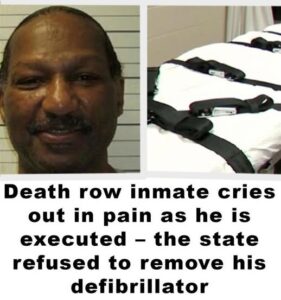Inmate Cries Out During Execution After Court Refuses to Disable Defibrillator

An execution in Tennessee sparked controversy after witnesses reported that the condemned man cried out in pain when his defibrillator continued to shock his heart during a lethal injection.
The inmate, 68-year-old Byron Black, was put to death nearly four decades after being convicted of killing his girlfriend and her two young daughters in 1988. The case drew renewed attention in the days leading up to his execution, as his legal team argued that leaving his defibrillator active during the procedure would only prolong his suffering.
Despite those concerns, state officials pressed forward. During the injection, Black lifted his head several times, gasped for air, and told the room, “Oh, it’s hurting so bad.” A spiritual advisor at his side tried to comfort him by singing and praying softly. He was pronounced dead at 10:43 p.m.
The Crime
Black’s crimes shocked Nashville in the late 1980s. Prosecutors said he gunned down 29-year-old Angela Clay in what they described as a jealous rage. He also murdered her daughters—Latoya (9) and Lakeisha (6)—while they slept. Lakeisha reportedly attempted to flee but was caught and killed.
At the time, Black was on work-release for previously shooting Angela’s estranged husband, Bennie Clay. Bennie later told investigators he believed Black killed his daughters purely out of spite.
Legal Battle Over Execution
In the hours before the lethal injection, Black’s attorneys pleaded with the courts to allow his implanted defibrillator to be disabled. They argued the device—which shocks the heart to correct irregular rhythms—would cause unnecessary pain during the execution, violating the Constitution’s ban on “cruel and unusual punishment.”
A trial judge initially sided with the defense, but the Tennessee Supreme Court overturned that ruling, stating the lower court lacked authority. Governor Bill Lee also refused to intervene.
Defense and Health Conditions
Black’s lawyer, Kelley Henry, called the execution “torture,” pointing to his severe health problems, including dementia, kidney failure, brain damage, and congestive heart failure. His defense team also emphasized his intellectual disabilities, arguing he should have been spared altogether.
Family Reactions
After the execution, Angela’s sister, Linette Bell, said:
“I thank God for making this happen. His family is going through what we went through 37 years ago. He never apologized, and he never admitted what he did.”
Her brother-in-law, Bennie Clay, whose daughters were among the victims, offered forgiveness but noted the deep loss:
“God has a plan for everything. He had a plan when he took my girls. They were smart, they were gonna be something. They never got the chance.”
Public Response
Reactions online were divided. Many expressed satisfaction that Black experienced pain, with one commenter writing: “Finally felt a little of what he put others through.” Others argued the suffering was justified, saying the victims’ families needed closure.